Refugees Dwelling in Former Kasakh Penal Colony Waiting for “Amensty” for 21 Years Already
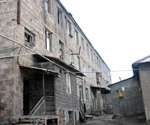 It’s alredy 21 years that about 50 families of refugees have been living in the former penal colony of Kasakh in Kotayk region. The Armenian refugees who fled from Azerbaijani Baku, Sumgait and Kirovabad cities were given a shelter in different buildings of this colony in 1988. They were promised that their living problems would be solved as soon as possible.
It’s alredy 21 years that about 50 families of refugees have been living in the former penal colony of Kasakh in Kotayk region. The Armenian refugees who fled from Azerbaijani Baku, Sumgait and Kirovabad cities were given a shelter in different buildings of this colony in 1988. They were promised that their living problems would be solved as soon as possible.
The refuges who up to now live in the bulding with no elementary utilities still cherish the hope that a day will come, and they will be granted “amnesty” and will be freed from the horrible living conditions that they have to endure now.
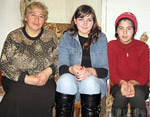 “The sanitary drain pipes are exploded or lack, in many places the roof is damaged and leaks everywhere. We don’t have drinking water in our homes. How can our children survive growing up in garbage, in damp rooms, surrounded with rats? It impossible to breathe here in summers, the situation becomes extremely insanitary.
“The sanitary drain pipes are exploded or lack, in many places the roof is damaged and leaks everywhere. We don’t have drinking water in our homes. How can our children survive growing up in garbage, in damp rooms, surrounded with rats? It impossible to breathe here in summers, the situation becomes extremely insanitary.
Everybody gets sick,” Roza Adamyan, 45 year old refugee from Baku, told about the problems that all of the refugees in this dwelling place have to face. Mrs. Roza could receive an apartment in Kasakh by persistant efforts of his acquaintants. She was informally elected the representative of the refugee residents of Kasakh. She touches upon their problems at the offices of various officials. She knows all of the Kasakh refugees personally. She can even tell about their lives and problems with many details, not saying a word about her our problems. Roza Adamyan and her two young daughters live in “an apartment” that used to serve as an administrative office room.
The room is so small that they have to pile things on each other just to make space for walking in the room. In order to sleep they have to move the only bed in the apartment from side to side, when the roof begins to leak. The only income that the family makes is 23000 drams of pension from “Paros” fund and the money that Mrs. Roza earns by working in the houses of other people.
“I can’t find any permanent job, as they say that I don’t speak Armenian, besides I can’t be registered as an employed worker, othervise I may lose the chance to get the pension from “Paros.”
Why should I deprive myself of the pension from “Paros,” if I am going to make a bit more money than 23000 drams of pension by working from morning till night,” Roza Adamyan said. Mrs. Roza vividly relcollects the days when she used to live in Baku with her mother. She was born and grown up in Baku.
She told us that when the mass riots began in Baku, she was working at a travel bureau. She took a vacation from the bureau and left for Armenia to find a job a travel bureau. Though in Armenia she was employed at the local travel bureau, she soon lost her job due to the bureau’s privatization. R.Adamyan told that they never had any problems with the very Baku residents who were their neighbours and were born in that city.
“We used to live in the Armenian district of Baku. There were many Armenians and very few Azeries living there. But the Azeries who came from Armenia and the Azeri villages began protesting, saying that they can’t live in their own capital, while the Armenians have good jobs and houses in Baku,” she recollected. Mrs. Roza’s mother hoped that the situation will soon get better and they will not have to leave Baku. But when the situation became strained they had to flee to Armenian leaving their belongings and apartment in Baku. They failed to exchange their apartment with an Azeri family who had already moved to Baku from Armenia and made them such a suggestion. She received her tuny apartment in Kasakh by efforts of her acquaintants. “We suffer and live with hope that very soon our living conditions will be imporved. My mother waited with the same hope many years and died in 2002,” she said. 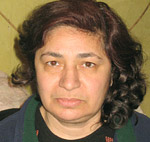
Maria Avanesyan from Baku remembers every detail of the Baku riots in late 1988. “I took both of my sons to the kindergarten, the elder one went to school. When I later went to the kindergarten to take my sons from there it was surrounded with tanks. The names of all Armenian children were on the gates of the kindergarten and nobody was inside. I looked for them several hours, then I learnt that the Azeri nurses have hidden them in the basement and let them go only with their parents from the backdoor. An Azeri boy whose mother was a Russian hid my son under the bushes and I could finally find him. By that time, we already had Azeri neighbours who came from Armenia. They were beating our children and threatening us, so we had to leave for Armenia on December 2nd,” she said. Maria Avanesian also remembered that the Azeries were setting on fire their belongings that they intended to bring to Armenian with them. The Avanesians found shelter in Kirovakan, when they arrived in Armenia. After five days they became the victims of December 7th disasterours earthquake. Maria’s eldest son sustained crainocerebral injury. “I lost him in 2002 after long lasting treatment,” she said without hiding her grief.
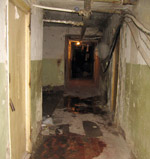 They settled down in Kasakh after the earthquake. Maria Avanesian, her husband and son live in a basement that the day light doesn’t reach. The corridor that leads to their home is flooded with waste water, while the walls “are decorated” with torn out electricity cabels that almost rach the floor. Just like in the houses of many refugees the walls of their apartment are black with dirt and cracked. The roof constantly leaks leaving the walls damp. Maria’s other son is a military man. He lives with his wife and 3 children in Shoushi. They rent an apartment. “They come here, live a month with us, get sick and leave again to get well there. It’s impossible to raise a child here. My third grandchild is a new born baby,” Maria Avanesian said. Maria doesn’t work, while her son and husband have no permanent job, which, certainly, makes the situation even worse.
They settled down in Kasakh after the earthquake. Maria Avanesian, her husband and son live in a basement that the day light doesn’t reach. The corridor that leads to their home is flooded with waste water, while the walls “are decorated” with torn out electricity cabels that almost rach the floor. Just like in the houses of many refugees the walls of their apartment are black with dirt and cracked. The roof constantly leaks leaving the walls damp. Maria’s other son is a military man. He lives with his wife and 3 children in Shoushi. They rent an apartment. “They come here, live a month with us, get sick and leave again to get well there. It’s impossible to raise a child here. My third grandchild is a new born baby,” Maria Avanesian said. Maria doesn’t work, while her son and husband have no permanent job, which, certainly, makes the situation even worse.
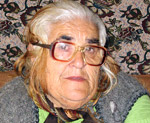 “On february 27th a friend of ours called us and warned us to stay at home, as the Turks are holding a rally in front of a local administration building. We din’t realize what had happened, but still stayed at home. I went to work the next morning and our boss told me “Raya, please, go home!” I came home, we locked the doors and waitied till the evening. In the evening, two cars stopped in front of our building,” Raisa Aroustamian, 75, remembered.
“On february 27th a friend of ours called us and warned us to stay at home, as the Turks are holding a rally in front of a local administration building. We din’t realize what had happened, but still stayed at home. I went to work the next morning and our boss told me “Raya, please, go home!” I came home, we locked the doors and waitied till the evening. In the evening, two cars stopped in front of our building,” Raisa Aroustamian, 75, remembered.
She survived by fleeing from sumgait. She lived with her husband, her daughter, her son, her daughter-in-law and her grandchildren. She said that none of her family members would survive, if their Azeri neighbours wouldn’t hide them one by one in their homes. “In blue and black clothes with blue and white flags in their hands the Turks were shouting “Death to Armenians!” “They were throwing stones at our house, though our neighbours told them that there are no Armenians living there, they knew that our family and another Armenian family lived there. They were checking the addreses of Armenians on official lists and documents. We had to leave the keys of our apartment to our upper Azeri neighbor and escaped to Armenia without taking our belongings. The Turks were throwing stones on our train also,” Mrs. Raisa said. With tears in her eyes Mrs. Raisa Aroustamina remembered that one of her grandchildren died after several weeks of their stay in Armenia, though they all were accepted very well and were provided with everything they needed at the Aghveran resorts.
“My grandson was ill. Fear and cold killed him in a week. It was my first loss. He would be 24, if we could only save him,” she said. The family received a 3 bedroom apartment in Spitak, in 6 months, but the earthquake destroyed everything and they found a new home in Kasakh. Mrs. Raisa lost her unborn grandchild in the earthquake, later, her husband passed away. “They told us that we are going to live here for a while and soon we’ll have a new home. It’s already 21 years that we have been living here. How can 6 people live in a kitchen? We have to cook, eat and sleep here. Our house’s basement is all flooded and we also have to endure dampness,” R. Aroustamian said. Mrs. Raisa said that none of their visitors ever refused a thing to them. They don’t say that they are not going to come again.
“They come and go. They keep saying that soon we’ll receive a new home. In 2006 we were told that by the President’s decree all of the refugees who hadn’t privatized their rooms will receive either homes or money to buy one. We were so glad, we thought that me and my son could receive money as separate families and by summing up what we got we could buy a house. We already kept our eye on a 25000 drams worth house. But they paid me only 7000 drams, while my son got 9000 drams. As a result we had only 16000. Where could we get the missing 8000?” she wondered. Mrs. Raisa said that they were offered to go and buy a house in the villages.
“My grandson died, my husband passed away. I have graves in two places. Where will the third grave be? They should either build a house or give enough money to people , so that refugees like us can buy houses. With the money they gave us I could buy a cowhouse. I am not 18 years old to buy a house in a village, to do gardening or work in an orchard. My children work here, what can I do? Thanks God, we earn our daily bread. But when can we live a normal life?” Raisa Arousatmian expressed her concern.
to be continued Translated by Anoush Mkrtchyan
 Videos
Videos Photos
Photos
Write a comment